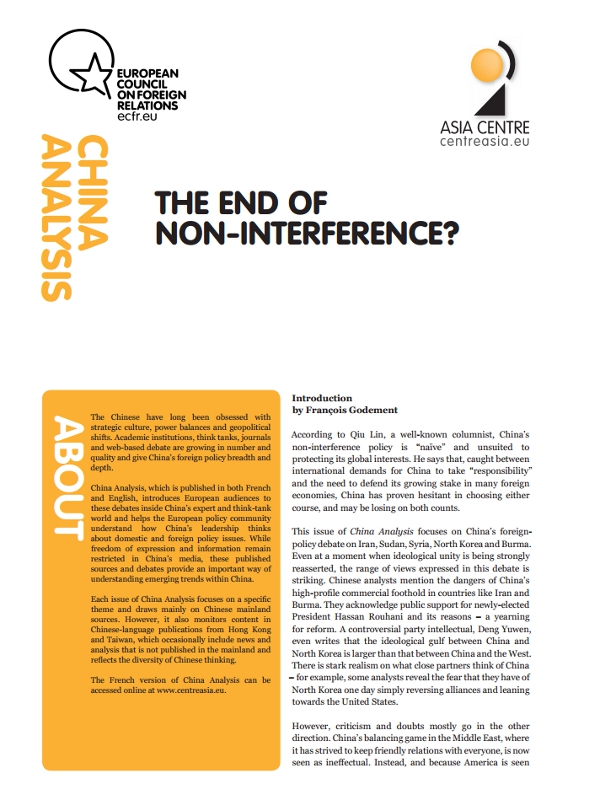China Analysis: The end of non-interference?
What are China’s interests in the Middle East?
China’s international role is changing. But the country is struggling to reconcile its traditional foreign policy of non-interference with its growing economic presence around the world. China’s relations with Iran or its response to the crisis in Syria are striking examples of how China is rethinking its foreign policy. This debate also sheds light on how China defines its interests in the Middle East and why Beijing is hesitant to support UN Council resolutions on issues such as Syria.
The latest issue of China Analysis – The end of non-interference? – published by ECFR and Asia Centre focuses on China’s foreign-policy on Iran, Sudan, Syria, North Korea and Burma. It shows a rich debate within China’s foreign policy community about China’s global ambitions and responsibilities:
China-Syria relations:
- China’s UN vetoes on Syria are a symbol of China’s new role on the international stage. Chinese analysts agree that ending the violence in Syria must be the ultimate goal but they disagree with the West on how to achieve it. More fundamentally, Chinese thinkers perceive the notion of “responsibility to protect” as a dangerous and vague concept that exists to legitimse “regime change”. The Chinese vetoes are also interpreted as a lesson for the West to show that China’s foreign policy is in fact based on strong principles such as the respect for non-interference in the internal affairs of other countries. Yan Xuetong for example argues that blocking Security Council resolutions is in China’s interest: It diverts the attention and capabilities of the US away from Asia, it reduces the risk of war between the US and Iran – and it strengthens Beijing’s partnership with Moscow.
China-Iran relations:
- Beijing’s quest for energy security has brought China closer to Iran over the last decade. But Chinese thinkers recognise that China’s relationship with Iran also drags China into the controversy surrounding Iran’s nuclear programme. Despite calls by the US and the EU to play a more active role in the resolution of the Iranian nuclear crisis – particularly in the enforcement of sanctions – Chinese analysts do not think this is in China’s interest. Instead, they suggest that China should pursue its own economic and security interests in the region, without paying attention to criticism from abroad. However, Chinese scholars are optimistic about the future of China-Iran relations. Zhao Kejin for example thinks that the new Iranian president Rouhani may see China as a “strategic opportunity” to break through the diplomatic impasse with the West.
“Non-interference may have hampered Chinese diplomacy by preventing nimble responses and protecting stodgy thinking. But moving to a more committed policy that is not afraid to take sides and favour particular domestic outcomes opens up a gulf of doubts and different answers. Little by little, China’s strategists are discovering the dilemmas of an imperial power” – François Godement
The European Council on Foreign Relations does not take collective positions. ECFR publications only represent the views of their individual authors.



